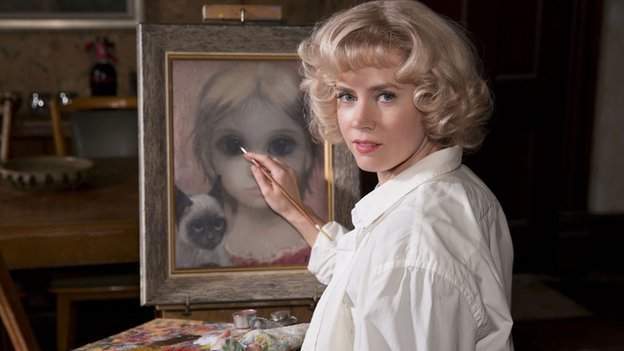
“Sadly, people don’t buy lady art,” Christopher Waltz declares in Tim Burton’s latest work, Big Eyes. The film, which is out this week, tells the true story of 1960s “kitsch” artist Margaret Keane, whose husband, Walter (played by Waltz), took credit for her paintings for over two decades, a deception fuelled partly by ego and partly, as the film suggests, by the indisputable fact that a woman’s artistic output is not as valuable as a man’s, with female painters yet to break the £10m barrier at auction while their male counterparts, who regularly sell for tens of millions, are hurtling towards £100m.
Following their eventual divorce, Keane sued her husband in order to prove authorship of her work, winning the case (and $4m in damages) after a climactic courtroom showdown in which both she and Walter were given an hour to complete a painting in front of the entire court. Walter bowed out, citing a shoulder injury; Margaret completed hers in 53 minutes. Yet despite her victory, when Big Eyes screenwriters Scott Alexander and Larry Karaszewsi approached Keane for the rights to her life story, she was hesitant. “Her key concern was that people might watch the movie and think Walter was the painter,” they explained in a recent article for the LA Times. “This blew our minds… she still feared that Walter’s PR spin would win in the court of public opinion.”
Keane’s hesitation may have “blown the minds” of two male screenwriters, but to many it is logical: history has proved that aspersions, once cast on the origins of a female-authored work, are impossible to ever truly shake off, even – or, perhaps, especially – if the work has achieved both critical and commercial success. Thus in a recent biography of Pulitzer Prize-winning author Nelle Harper Lee, Marja Mills writes: “Nelle was offended by the speculation, never substantiated but persistent, that [Truman] Capote might have had a hand in writing Mockingbird.” The idea that Capote, Lee’s one-time friend and neighbour, wrote To Kill A Mockingbird may come as a surprise to many of the book’s fans but, despite an overwhelming lack of evidence and the rumour’s ambiguous origins, it crops up regularly on internet forums and in biographies of both Lee and Capote. Similarly, writer Mary Shelley is the subject of persistent rumours that her magnum opus, Frankenstein, was actually written by her husband Percy Bysshe Shelley. “The logic goes something like this,” Germaine Greer, addressing one such discourse, explains. “Frankenstein is a masterpiece; masterpieces are not written by self-educated girls and therefore Frankenstein cannot have been written by Mary Shelley.” Disappointingly, Greer’s rebuttal of this logic appears to affirm it. Mary must be the real author of Frankenstein, Greer argues, because Frankenstein “is not a good, let alone a great novel”, thus reinforcing the concept that women are incapable of producing highly-regarded artistic work.
This belief is not only prevalent in art and literature but also in music, another male-dominated space in which the few women who achieve credible success – as opposed to success predicated on simply being a miming marionette – are subject to similar smears. Many, for example, still believe Nirvana frontman Kurt Cobain wrote his wife Courtney Love’s most critically-acclaimed album, Live Through This. “When it comes to my writing and his writing no, the answer is no! Kurt did not write Live Through This,” Love has said of the rumours. “I never wanted to comment on this. I never wanted to, but it gets on my tits, it really does. They’re just trying to take my power away from me. It’s just so gross and nonsensical.”
So why are we, as a society, so ready and willing to listen to denials of female authorship even where they are based on the flimsiest of evidence? The answer surely lies in the value – or lack thereof – of women’s creative endeavours. While society has graciously granted women access to tools – pens, paintbrushes and guitars – it does so in the knowledge that women’s contributions will never be as highly regarded as their male counterparts’: their paintings do not fetch such astronomical sums at auction; their books are given pink jackets and designated “chick lit”; they are even paid less for doing the same office jobs. “It’s a constant source of disappointment to see the discrepancy in prices between outstanding female artists and their male counterparts,” art dealer Iwan Wirth has said.
Is it any wonder, then, that when a woman does sell over 30 million copies of her book, as Harper Lee has done, or millions of prints and postcards of her paintings, as Keane did at the height of her fame in the 1960s, we are inclined to be suspicious. For sadly it is a truth universally unacknowledged that a woman’s artistic output is held to such a low standard that on the rare occasions it does – almost despite its author – achieve critical or commercial success, it is simply easier to believe it was created by a man.





